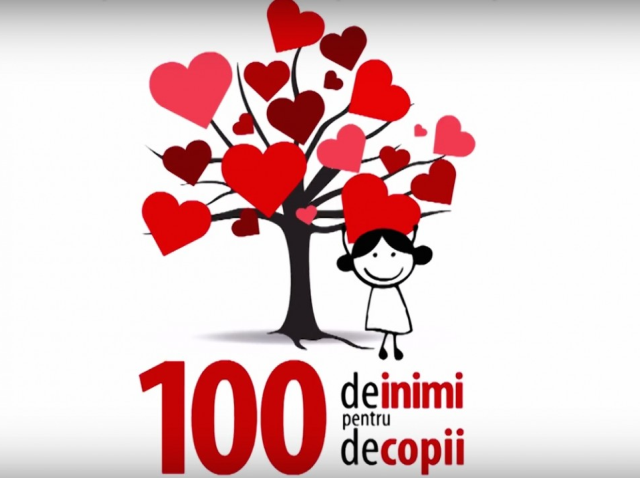100 hearts for 100 children
This EU-funded award-winning project helps children born with heart defects.

Ana-Maria Cononovici, 18.04.2018, 13:23
Today we’ll be talking about a successful
project that received a prize at the 2017 Structural Funds Awards Gala. The
project is called 100 Hearts for 100 Children and obtained the 2nd
place in a special category for projects that support professional training.
Thanks to this project, a new medical specialisation is now available for
resident doctors in Romania since 2016, namely paediatric cardiology. Not to
mention that the project is also saving lives. Cristian Grassu is a secretary
of state within the Health Ministry and he told us about the cooperation
between the Romanian state institutions and the European ones in implementing
projects in the healthcare field:
Important efforts are being made, we have
looked for help and funding in many places, and the European Commission has
always been there to help, especially in this mandate. This project is proof
that a lot can also be done in Romania with the help of European funds and this
is not the only example. Some projects have received more funds, others less,
some even rely on volunteers, but all of them have the same goal, namely to
save more lives and to cure more patients. At present, Romania’s priority is
the infrastructure, and this is one of the main reasons why we are not yet
satisfied with the quality of health services or, for that matter, with the
quantity of services we receive. We do have an infrastructure problem: the last
public hospital to be built in Romania was in 1981 and the only medical
building with a medical purpose to be built in the meantime has been in Iasi.
All the other hospitals were built in the 1970s and even earlier, some are even
historical monuments.
Physician and journalist Vlad Mixich has
identified one of the paradoxes facing Romania:
Congenital heart defects are one of the causes
of infant mortality. Infant mortality comes up in the Romanian media at least
once a year, whenever there’s some new statistics or article showing how bad
things are in the Romanian healthcare system. And this is where the paradox
lies. Indeed, Romania has the highest infant mortality rate in the European
Union, but at the same time, the effort to reduce infant mortality that began
in 1990 has been one of the most successful endeavours in Romanian medicine.
Romania has seen the fastest dropping rate of infant mortality in the world.
The drop was very fast in a very short time. Although we are still in the last
place in the classification, things are improving much faster than in other countries
faced with this problem.
The situation has improved also thanks to the
project 100 Hearts for 100 Children. The manager of the Institute of
Cardiovascular Diseases in Iasi, Professor Grigore Tinica has explained that
the Institute agreed to participate in this European project if a number of
children were also to benefit from surgery. The project provided specialist
training programmes abroad for all categories of medical staff working in the
sensitive domain of paediatric cardiovascular surgery. The initial target was
100 surgeries but this figure has been exceeded by now. Professor Tinica
explains:
Between 1,500-2,000 children with congenital
heart defects are born in Romania every year. 800 or 900 need surgery in the
first year of life, but only 250 or 300 surgeries are performed at the moment.
So, many of them don’t get the surgery they need, and they grow up, turn 10,
12, 15 or even become adults and still haven’t undergone the procedure. That’s
about 1,000 cases of congenital heart defects that need operation in Romania.
There are several hospitals that perform this type of surgery. Paediatric
cardiovascular surgery is much more difficult than the other type of surgery
because a young child is a completely different universe.
While the ministry can draw up policies, access
funds and try to change mentalities, it’s the people in the front line, the
doctors, the nurses, the therapists and the kinetotherapists, who are
implementing the projects. They are sometimes joined by civil society representatives.
The Inima Copiilor Association is one such example. The association supports
children with medical problems, especially children with heart conditions.
Alexandru Popa, the association’s president, has explained:
We have decided to support heart surgery
because in 2006, when the association was set up, congenital heart disease was
the main cause of non-accidental child mortality. Things have changed somehow,
but not completely, and there are still very many children who die of heart
disease because they are not diagnosed in time, because they are not operated
on and because their parents don’t know where to take them. We hope this
situation will change. We’ve tried to help develop these centres instead of
focusing on individual cases, even if we’re always being asked for help and
it’s difficult to say no. Our association has raised over 4 million euros from
sponsorships and private donations, funds which have went to infrastructure
projects and have been injected into the public healthcare system. We want to
continue.
This project is definitely a success, given
that surgery is currently performed on children as young as two weeks, but
there is much more that needs to be done, as all our interlocutors have
emphasised.






























